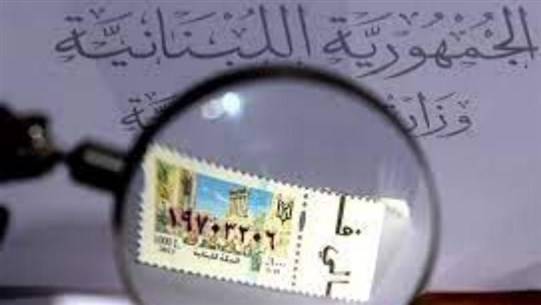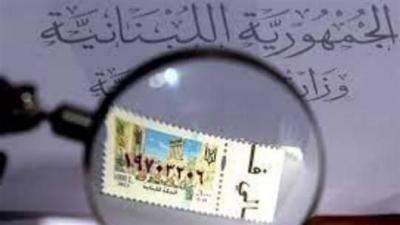“My last concern is about who is claiming... and who is right... and who will win the lawsuit... I want to know where they found stamps.” This was a comment on a Facebook post regarding a complaint submitted yesterday by President Nabih Berri and his wife against Judge Ghada Aoun for several offenses, including slander. The complaint is thick with stamps at a time when they are scarce, and their prices are skyrocketing. It is comically tragic when the cost of a thousand-lira stamp is twenty thousand or more, if the "brokers" are gracious enough to accept less than fresh dollars. There is a direct link between stamps and the dollar.
Here are some figures: According to the International Information organization, stamp revenues in Lebanon were estimated at 103 billion lira in 2022, up from 83 billion lira the previous year. The financial stamp, also known as the official stamp, is meant to highlight the nation's heritage, history, traditions, achievements, and commemorate its heroes and national holidays, as well as the country’s beauty. However, here in our glorious homeland, it has turned into a burden added to the daily sufferings of the Lebanese, who are not short on heavy troubles. The black market is opportunistically waiting to enter the fray in such cases.
### Searching for the Licensed Ones
We are currently in a crisis. Stamps are "cut off," and their trade is thriving. We contact Iskander Hallak, the head of the Treasury Department, who was appointed about three months ago, to learn more about the reasons for this apparent crisis. Hallak explains that the high printing costs and the inability to secure them due to the lira's collapse have led to a drop in production compared to market demands. As demand for stamps surged, either for hoarding or fear of shortages, the black market began to flourish.
But who is authorized to receive stamps? “There are two categories: those who receive stamps legally from the Ministry of Finance, who are the licensed dealers, totaling 672 (73 of whom are not actively operational) distributed across all Lebanese territories. The second category is the public who cannot buy stamps from licensed dealers, so they resort to the “public fund,” which is limited to the Beirut governorate and opens three days a week (Tuesday, Wednesday, and Thursday),” Hallak responds.
### Reservations and Deprivations
We ask again about the reasons that contributed to the flourishing of the black stamp market, and Hallak clarifies that pressure began when huge numbers began flocking to the public fund, surpassing 300 daily. “Our goal as the Ministry of Finance is to meet the public's needs for stamps, and we cannot prevent anyone from obtaining them. So, every motorcycle delivery worker carrying 100,000 lira in their pocket buys 100 stamps to sell for 300,000 lira,” he adds. Consequently, a decision was made to prevent any individual from receiving more than 100 stamps at a time after verifying their identity and recording their phone number. However, as is the case with "cleverness" in our region, it later turned out that the registered phone numbers were incorrect, and many names were fictitious. Call it the "smartness" of traders or their audacity; it makes no difference. The number of complaints began to increase after measures to limit the quantities delivered were imposed, according to Hallak, but he sees this as the only solution to prevent those selling stamps from monopolizing the market.
Returning to the licensed dealers, statistical studies revealed that stamps were not being distributed fairly. Some licensed dealers manage to secure significantly larger quantities than others, resembling a stamp reservation process, depriving other licensed dealers of their needs. “Since production is currently less than demand, we began rationing stamp deliveries to the licensed dealers so that no one dealer can purchase more than 15 million lira at once, ensuring distribution is parallel and fair,” Hallak stated. Reselling stamps without a license is an illegal act. Stamp purchases are for personal use only; if a licensed dealer does so, their license is supposed to be revoked. In general, the tax administration notifies judicial authorities upon receiving any complaint from the central committee for oversight and auditing to carry out their work as a judicial authority. Here, the case often falls into delays, if not stagnation from the start.
### The Army Supports
Hallak believes that making any decisions currently is impossible given the limited finances, yet the goal remains to meet market needs for stamps. For weeks, they have been working on printing 15 million stamps in collaboration with the Army’s printing press. Why the army? Because the Ministry of Finance previously issued three million 1000-lira stamps on December 10, 2020, which were printed at the Directorate of Geographic Affairs of the Lebanese Army due to a consensual agreement between the two parties dating back to November 2020. This agreement involved commissioning the directorate to print 20 million stamps of all categories, of which 5 million were received earlier... and now this agreement is being resumed. We inquire about the reasons for the delay in implementing the agreement, and he points out that “this came as a result of the financial crisis, and we subsequently reduced the number of stamps needed based on the army's capabilities. Each time we receive a certain quantity, we hold a delivery committee meeting and issue a decision to put them into circulation.”
Stamp printing is not unlike printing money. It is not a routine process, as there are specific procedures to follow. The decision to print is mutual, starting with a request from the treasury director to the General Treasury Directorate and the Minister of Finance, before beginning the bidding process to ensure everything follows legal procedures. In this context, on October 24, 2022, a decision was issued to put 5 million stamps of 2000 lira into circulation, beginning distribution, with the condition that no more than 200 stamps are delivered to professionals, restricting ordinary individuals to receiving just 50 to 100.
### A Solution or No Solution
Hallak mentions that eliminating the black stamp market relies on three key points: First, the treasury must be capable of saturating the market with stamps, which is difficult to achieve under the public procurement law and the inability to execute new contracts. Organizing the withdrawal and distribution process comes in second place, limiting the quantities distributed to individuals. Thirdly, internal control plays a vital role in preventing anyone from obtaining random quantities. “We have requested a weekly report from all centers to clarify how stamps are distributed among licensed holders. We also sent a letter to the stamp supervision authority - the central secretary for oversight and audit of stamp funds - asking for clarification on the oversight tasks undertaken by the authority, to which the response was related to the COVID pandemic, transportation crises, electricity shortages, and strikes,” Hallak tells us. A response that is, of course, not surprising. Furthermore, a recent recommendation from the treasury is awaiting developments, proposing to open public funds in all regions and finance centers to prevent deliveries from being limited to Beirut. Hallak believes that by facilitating stamp access, the doors are closed to those controlling the black market.
In conclusion, while many advanced countries are moving towards abolishing the use of the financial stamp in favor of a JPS computing system, Hallak points out that work is ongoing to develop future plans. One idea involves using stamp vending machines—pre-filled machines that are currently used in banks and the Ministry of Foreign Affairs—which may reduce the demand for paper stamps. He also mentioned the e-stamp, which requires only an application decree to begin implementation. To combat forgery and reduce the phenomenon of the black market, as Hallak concludes, the need is not for more paper and procedures but for laws that regulate the entire process, accompanied by increased oversight. Meanwhile, good luck to those in need of a stamp... or more.
For those who don't know, the first postage stamp in the world appeared in 1840 in England, while Egypt was the first Arab country to issue its own stamps in 1866, followed by Morocco, Tunisia, Algeria, Saudi Arabia, and Iraq. In 1921, the first Lebanese-Syrian stamp named "Greater Lebanon" was issued and was a French stamp. Afterwards, the Lebanese postal service issued its first collection of stamps adorned with the phrase "République Libanaise" in 1925, later including its Arabic translation (الجمهورية اللبنانية) in 1927. Thus began the regular and commemorative issuances, with the year 1946 witnessing the release of the first independent Lebanese stamp valued between ten qirsh and five lira.
Fast forward to the new millennium, where in 2008, France and Lebanon issued their first joint postage stamp featuring a cedar tree on the eastern shore of the Mediterranean and an oak alongside a map of France on its northwestern shore. In 2010, a stamp was issued in honor of Imam Musa al-Sadr, valued at 1400 lira. This was followed in 2011 by stamps bearing the names and images of notable Lebanese figures across various fields, including Fairouz, Sabah, Wadi' al-Safi, Said Aql, Hassan Aladdin (Shosho), and the Caracalla troupe, among others.




